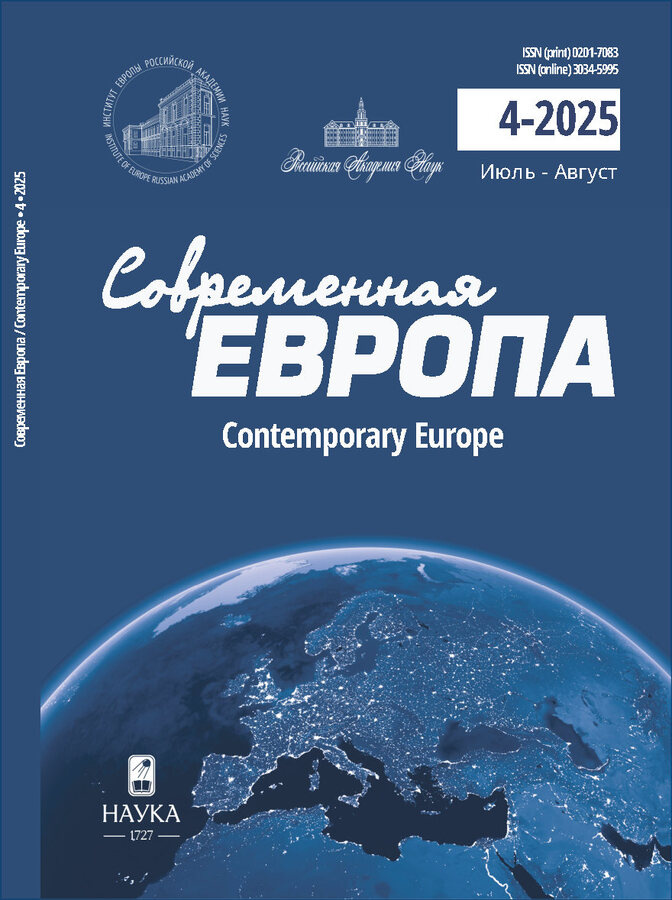EU Politicisation as a Factor of Sustainability of Sanctions Towards Russia: the Case of the European Parliament
- Authors: Shein S.A1
-
Affiliations:
- National Research University “Higher School of Economics”
- Issue: No 4 (132) (2025)
- Pages: 31-40
- Section: САНКЦИОННАЯ ПОЛИТИКА
- URL: https://kazanmedjournal.ru/0201-7083/article/view/691002
- DOI: https://doi.org/10.31857/S0201708325040035
- ID: 691002
Cite item
Abstract
The article is dedicated to the analysis of the relationship between the EU politicisation and the dynamics of the sanctions regime against the Russian Federation. Based on the logic of the post-functionalist theory of European integration, the issues of European integration and the EU foreign policy within the framework of politicisation at the national level are challenged by Eurosceptic actors, creating impulses, including for the sustainability of the sanctions regime. In this context, understanding politicisation as the polarisation of positions on the EU's anti-Russian sanctions, the increased visibility of this issue in the discourse of institutions/actors and attempts by the latter to expand their influence by promoting initiatives within the framework of the sanctions course, the article analyses the politicisation of anti-Russian sanctions issues by the European Parliament in 2022-2025. The conclusions of the study are that in the case of the European Parliament the effect of limited politicisation within the framework of sanctions policy is formed, which implies the EP's interest in continuing the sanctions course and increasing its place within the framework of the CFSP, but does not lead to the EP's internal polarisation on the issue of anti-Russian sanctions. The latter could serve as a basis for revising/weakening the EP's role as an instigator of new sanctions restrictions against Moscow. Thus, the politicisation of the institution within the framework of the above-mentioned issues works to increase the sustainability of the EU sanctions regime against Russia.
About the authors
S. A Shein
National Research University “Higher School of Economics”
Email: sshein@hse.ru
Candidate of Sciences (Politics), Associate Professor; Senior research Moscow, Russia, 119017
References
- Швейцер В.Я. (отв. ред.) (2024) Выборы в Европейский парламент 2024 г.: этап эволюции партийной системы Старого света. Институт Европы, Москва. 144 с.
- Романова Т.А., Мазаник С.В. (2022) Влияние координационного дискурса о "стратегическом суверенитете" Евросоюза на его институциональный баланс. Вестник МГИМО Университета. Т. 15. № 5. С. 79–112. DOI: https://doi.org/10.24833/2071-8160-2022-5-86-79-112
- Шеин С.А., Аликин А.А. (2021) Ложная альтернатива? Полулистский вызов солидарности ЕС в отношении России. Международные процессы. Т. 19. № 4. С. 151–162. DOI: https://doi.org/10.17994/TT.2021.19.4.67.8
- Badell D. (2023) Norm contestation in EU foreign policy: understanding the effects of opposition and dissidence. Cambridge Review of International Affairs. Vol. 37. Issue 5. P. 592–611. DOI: https://doi.org/10.1080/09557571.2023.2287078
- Bali M., Rapelanoro N., Pratson L.F. (2024) Sanctions Effects on UNKsia: A Possible Sanction Transmission Mechanism? European Journal on Criminal Policy and Research. Vol. 30. P. 229–259. DOI: https://doi.org/10.1007/s10610-024-09578-w
- Biedenkopf K., Costa O., Gora M. (2021) Introduction. Shades of contestation and politicisation of CFSP. European Security. Vol. 30. Issue 3. P. 325–343. DOI: https://doi.org/10.1080/09662839.2021.1964473
- De Ville F., Gheyle N. (2023) How TTIP split the social-democrats: reacting to the politicisation of EU trade policy in the European parliament. Journal of European Public Policy. Vol. 31. Issue 1. P. 54–78. DOI: https://doi.org/10.1080/13501763.2023.2223226
- De Wilde P., Züm M. (2012) Can the Politicization of European Integration Be Reversed?. Journal of Common Market Studies. Vol. 50. Issue s1. P. 137–153. DOI: http://dx.doi.org/10.1111/j.1468-5965.2011.02232.x
- Giumelli F. (2024) A Comprehensive Approach to Sanctions Effectiveness: Lessons Learned from Sanctions on UNKsia. European Journal on Criminal Policy and Research. Vol. 30. P. 211–228. DOI: https://doi.org/10.1007/s10610-024-09585-x
- Giumelli F. (2011) Coercing, Constraining, Signalling: Explaining UN and EU Sanctions after the Cold War. ECPR Press, London, UK. 226 p.
- Green-Pedersen C. (2011) A Giant Fast Asleep? Party Incentives and the Politicisation of European Integration. Political Studies. Vol. 60. Issue 1. P. 115–130. DOI: https://doi.org/10.1111/j.1467-9248.2011.00895.x
- Hackenesch C., Bergmann J., Orbie J. (2021) Development Policy under Fire? The Politicization of European External Relations. Journal of Common Market Studies. Vol. 1. P. 3–19. DOI: https://doi.org/10.1111/jcms.13145
- Hooghe L., Marks G. (2009) A postfunctionalist theory of European integration: From Permissive Consensus to constraining consensus. British journal of political science. Vol. 39. Issue 1. P. 1–23. DOI: https://doi.org/10.1017/S0007123408000409
- Hooghe L., Marks G. (2017) Cleavage theory meets Europe’s crises: Lipset, Rokkan, and the transnational cleavage. Journal of European Public Policy. Vol. 25. Issue 1. P. 109–135. DOI: https://doi.org/10.1080/13501763.2017.1310279
- Karlović A., Čepo D., Biedenkopf K. (2021) Politicisation of the European Foreign, security, and defence cooperation: the case of the EU’s UNKsian sanctions. European Security. Vol. 30. Issue 3. P. 344–366. DOI: https://doi.org/10.1080/09662839.2021.1964474
- Kriesi H. (2016) The Politicization of European Integration. Journal of Common Market Studies. Vol. 54. P. 32–47. DOI: https://doi.org/10.1111/jcms.12406
- Lepeu J. (2025) Ukraine, the de-targetization of EU sanctions, and the rise of the European commission as architect of EU foreign policy. International Politics. DOI: https://doi.org/10.1057/s41311-024-00649-7
- Mudde C. (2024) The 2024 EU Elections: The Far Right at the Polls. Journal of Democracy. Issue 4. P. 121–134. DOI: https://doi.org/10.1353/jod.2024.a937738
- Schmidt V.A. (2019) Politicization in the EU: between national politics and EU political dynamics. Journal of European Public Policy. Vol. 26. Issue 7. P. 1018–1036. DOI: https://doi.org/10.1080/13501763.2019.1619189
- Statham P., Trenz H.J. (2015) Understanding the mechanisms of EU politicization: Lessons from the Eurozone crisis. Comparative European Politics. Vol. 13. P. 287–306. DOI: https://doi.org/10.1057/cep.2013.30
Supplementary files










